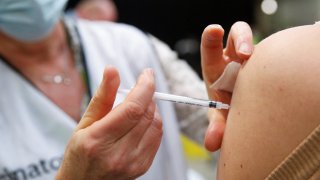
- The U.S. Food and Drug Administration's independent panel of advisors recommended that updated Covid shots for the fall and winter target one of the XBB variants, which are now the dominant strains of the virus nationwide.
- Advisors also generally agreed that the new shots should specifically target a variant called XBB.1.5.
- The panel's recommendation is a win for vaccine manufacturers Pfizer, Moderna and Novavax, all of which have been developing versions of their respective shots targeting XBB coronavirus variants.
- The FDA typically follows the advice of its advisory committees but is not required to do so.
The U.S. Food and Drug Administration's independent panel of advisors on Thursday recommended that updated Covid shots for the fall and winter target one of the XBB variants, which are now the dominant strains of the virus nationwide.
The committee unanimously voted that the new jabs should be monovalent — meaning they are designed to protect against one variant of Covid — and target a member of the XBB family.
Those strains of Covid are descendants of the omicron variant, which caused cases to surge to record levels early last year. They are some of the most immune-evasive strains to date.
Get Tri-state area news and weather forecasts to your inbox. Sign up for NBC New York newsletters.
Advisors also generally agreed that the new shots should specifically target a variant called XBB.1.5. The panel only discussed that specific strain selection and did not vote on the matter.
XBB.1.5 accounted for nearly 40% of all Covid cases in the U.S. as of early June, according to data from the Centers for Disease Control and Prevention. That proportion is slowly declining, and cases of the related XBB.1.16 and XBB.2.3 variants are on the rise.
Advisors noted that XBB.1.5 appears most ideal for the fall since vaccine manufacturers Pfizer, Moderna and Novavax have already started to develop jabs targeting the strain.
Money Report
"The 1.5 looks good. It seems like it's the most feasible to get across the finish line early without resulting in delays and availability," said Dr. Melinda Wharton, a senior official at the National Center for Immunization and Respiratory Diseases. "The vaccine we can use is the vaccine that we can get. And so it feels like this would be a good choice."
The FDA typically follows the advice of its advisory committees, but is not required to do so. It's unclear when the agency will make a final decision on strain selection.
There is also uncertainty about which age groups the FDA and CDC will advise to receive the updated shots this fall.
But the panel's recommendation is already a win for Pfizer, Moderna and Novavax — all of which have been conducting early trials on their respective XBB.1.5 shots ahead of the meeting.
"Novavax expects to be ready for the commercial delivery of a protein-based monovalent XBB COVID vaccine this fall in line with today's [advisory committee] recommendation," said John Jacobs, the company's president and CEO.
The U.S. is expected to shift vaccine distribution to the private sector this fall. That means the vaccine makers will start selling their new Covid products directly to health-care providers and vie for commercial market share.
The panel's recommendation coincides with a broader shift in how the pandemic impacts the country and the world at large.
Covid cases and deaths have dropped to new lows, governments have rolled back stringent health mandates like masking and social distancing and many people believe the pandemic is over altogether.
But Dr. Peter Marks, head of the FDA's vaccine division, said the agency is concerned that the U.S. will have another Covid wave "during a time when the virus has further evolved, immunity of the population has waned further and we move indoors for wintertime."
Updated Covid vaccines that are periodically updated to target a high circulating variant will restore protective immunity against the virus, said Dr. David Kaslow, a senior official in the FDA's vaccine division.
It's a similar approach to how the strains are selected for the annual flu shot. Researchers assess strains of the virus in circulation and estimate which will be the most prevalent during the upcoming fall and winter.
But it's unclear how many Americans will roll up their sleeves to take the updated shots later this year.
Only about 17% of the U.S. population — around 56 million people —have received Pfizer and Moderna's boosters since they were approved in September, according to the CDC.
More than 40% of adults 65 and older have been boosted with those shots, while the rate among younger adults and children ranges between 18% and 20%.
Those boosters were bivalent, meaning they targeted the original strain of Covid and the omicron subvariants BA.4 and BA.5.
Pfizer, Moderna and Novavax shot data
During the meeting, Pfizer, Moderna and Novavax presented preliminary data on updated versions of their shots designed to target XBB variants.
Moderna has been evaluating shots targeting XBB.1.5 and XBB.1.16 — another transmissible omicron descendant, according to Rituparna Das, the company's vice president of Covid vaccines.
Preclinical trial data on mice suggests that a monovalent vaccine targeting XBB.1.5 produces a more robust immune response against the currently circulating XBB variants than the authorized bivalent shot targeting BA.4 and BA.5, according to Das.
She added that clinical trial data on more than 100 people similarly demonstrates that the monovalent XBB.1.5 vaccine produces protective antibodies against all XBB variants. All trial participants had previously received four Covid vaccine doses.
Das said that comprehensive protection against XBB strains is likely due to the fewer unique mutations between the variants, which means their composition is similar.
There are only three unique mutations between the variants XBB.1.5 and XBB.1.16, according to Darin Edwards, Moderna's Covid vaccine program leader. By comparison, there are 28 mutations between omicron BA.4 and BA.5.
That means the immune response an updated shot produces against XBB variants will likely be similar, regardless of which specific variant it targets, Edwards said.
Pfizer also presented early trial data indicating that a monovalent vaccine targeting an XBB variant offers improved immune responses against the XBB family.
The company provided specific timelines for delivering an updated vaccine, depending on the strain the FDA selects.
Pfizer will be able to deliver a monovalent shot targeting XBB.1.5 by July and a jab targeting XBB.1.16 by August, according to Kena Swanson, the company's senior principal scientist.
Pfizer won't be able to distribute a new shot until October if the FDA chooses a completely different strain, Swanson said.
Novavax did not provide a specific timeline for delivering a shot targeting XBB.1.5, but noted that an XBB.1.16 shot would take eight weeks longer.
Novavax unveiled preclinical trial data indicating that monovalent vaccines targeting XBB.1.5 and XBB.1.16 induce higher immune responses to XBB subvariants than bivalent vaccines do.
Data also demonstrates that an XBB.1.5 shot produces antibodies that block XBB.2.3 from binding to and infecting human cells, according to Dr. Filip Dubovsky, Novavax's chief medical officer.
Dubovsky said the trial results support the use of a monovalent XBB.1.5 shot in the fall.
Novavax's jab uses protein-based technology, a decades-old method for fighting viruses used in routine vaccinations against hepatitis B and shingles.
The vaccine works differently than Pfizer's and Moderna's messenger RNA vaccines but achieves the same outcome: teaching your body how to fight Covid.






